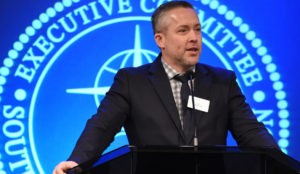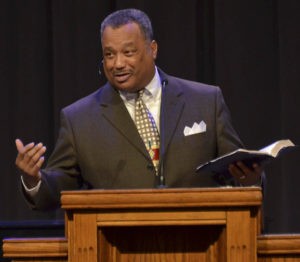Nearly three weeks after presidents of the six Southern Baptist Convention seminaries issued a controversial statement on systemic racism, other elected leaders within the SBC began to respond to the criticisms — although not with the same clarity with which critics have denounced the seminary leaders.
The most tangible action announced to date came from SBC Executive Committee President Ronnie Floyd, who has set a meeting for the first week of January with officers of the SBC’s National African American Fellowship, the SBC seminary presidents and SBC President J.D. Greear.

J.D. Greear (Photo: Baptist Press)
On Friday, Dec. 18, the same day that meeting was announced, Greear released his own statement on the issue, responding to a group of Black SBC pastors who have produced their own document, titled “A Statement on Justice, Repentance and the SBC.”
SBC elected leadership has not responded publicly to several high-profile defections from the denomination that came in response to the seminary leaders’ denunciation of Critical Race Theory. Chief among those departures have been Ralph West of Church Without Walls in Houston and Charlie Dates of Progressive Baptist Church in Chicago.
Nor have they responded publicly to a scathing indictment of the SBC seminary leaders by Joel Gregory of Baylor University’s Truett Seminary published in BNG Sunday, Dec. 20, nor a BNG interview with California pastor J. Alfred Smith Sr., who called the seminary presidents “complicit with evil.”
What the debate is about
The current drama began Nov. 30 when the SBC seminary presidents issued a document celebrating the Baptist Faith & Message 2000, the SBC’s doctrinal statement that Al Mohler, president of Southern Baptist Theological Seminary in Louisville, Ky., edited 20 years ago. In that anniversary document, the seminary leaders took on Critical Race Theory as “incompatible” with the SBC’s beliefs and said their schools will not teach it.
One of the seminary presidents, in a statement accompanying the document’s announcement, called Critical Race Theory “Marxist,” echoing President Donald Trump, who has forbidden federal agencies and contractors from training employees about systemic racism.
Critical Race Theory is an academic construct that highlights embedded forms of racism in culture and points toward ways of bridging those divides. Trump and other conservatives have denied systemic racism is real and have labeled Critical Race Theory as “Marxist” or “Socialist” or “atheistic.”
Statement on justice and repentance

Fred Luter
Among 230 signers of the “Statement on Justice, Repentance and the SBC,” the most notable names were Fred Luter, senior pastor of Franklin Avenue Baptist Church in New Orleans, and the only Black person ever to serve as president of the SBC; and Dwight McKissic, senior pastor of Cornerstone Baptist Church in Arlington, Texas, and a frequent critic of the SBC’s slow response to its history of racism.
Organizers said their statement was released on Dec. 18 to mark the 155th anniversary of the proclamation of the 13th Amendment, which abolished slavery.
After citing the words of Jesus’ first sermon in Nazareth, as recorded in Luke’s Gospel — a sermon about social justice — the statement notes that “human inability to achieve full justice before the return of Christ cannot become an excuse to avoid dealing with injustices in our lifetime.”
It adds: “The Southern Baptist Convention was founded with injustice toward African slaves at its very core. The SBC was founded, in large part, so that white Southern slave-holding Christians could appoint and support missionaries while continuing to hold their slaves in chains. This historical reality is neither disputed, nor can it be ignored.
“Many people deny the existence of systemic injustice as a reality.”
“Yet in the current moment, we see attempts to downplay this historical reality. Many people deny the existence of systemic injustice as a reality. Many who recognize systemic injustices are labeled as ‘Marxists,’ ‘Liberals,’ and ‘Critical Race Theorists,’ even though they are theologically orthodox and believe in the total sufficiency of Scripture.”
Then the statement charges that “the actions of some in the SBC appear to be more concerned with political maneuvering than working to present a vibrant, gospel-loving, racially and culturally diverse vision.”
After some progress, “recent events have left many brothers and sisters of color feeling betrayed and wondering if the SBC is committed to racial reconciliation.”
It acknowledges that “what has felt like progress to our brothers and sisters of color has caused many of our white brothers and sisters to believe they are on the ‘losing’ side. We do not believe this is about a ‘winning’ or ‘losing’ side. We believe this is about being faithful to the gospel of Jesus and the ethics he calls us to as his people.”
The signers express solidarity with the National African American Fellowship of the Southern Baptist Convention, which on Dec. 11 issued its own statement pushing back on the seminary presidents.
Signers “stand firmly in opposition to any movement … that denies the reality of systemic injustice.”
The signers also said they “stand firmly in opposition to any movement … that denies the reality of systemic injustice.”
And it ends with this warning: “Future cooperation remains possible and preferred if we commit to biblical justice and repentance in the SBC. However, if these commitments are not upheld, then it will signal to many in the SBC that cooperation has already ceased to exist.”
SBC president responds
Greear, pastor of The Summit Church, in Durham, N.C., posted a response on his personal website Dec. 18. He also is an advocate of changing the Southern Baptist Convention’s name to Great Commission Baptists, a term he uses throughout his document.
Of the statement signed by Luter and McKissic and others, Greear said: “I encourage all Great Commission Baptists to carefully and soberly consider these words. The SBC was founded with the unjust and ungodly assumptions about race, and even though we have acknowledged and repudiated these injustices, we recognize sin, being a reproach to any people, leaves a long tail of destruction. It corrupts our institutions and subtly shapes our perspectives in ways that deserve careful introspection and humble listening.”
He called Critical Race Theory a “worldly” philosophy but said “there are often things we can learn from questions raised and observations made.”
Without naming offenders, he chided anyone who would negatively label those who believe Critical Race Theory has value as well as those who are criticizing the seminary presidents. “We must not default to labeling believers who parse certain questions differently ‘Marxist’ or ‘racist.’ This uncharitable spirit is not only intellectually lazy, it is a sin against the body of Christ.”
While neither affirming nor denouncing Critical Race Theory, Greear noted: “I have found that Great Commission Baptists across this nation long for greater diversity in our convention and for that diversity to be reflected in our leadership.” The six seminary presidents are all white males.
What’s next
As controversy over the seminary presidents’ denial of Critical Race Theory has spread, Baptist Press, the SBC’s official news service, has not reported beyond the official statements made. Coverage of the criticism has been published regularly in BNG, the Texas Baptist Standard and in Religion News Service.
SBC Executive Committee President Ronnie Floyd offered a brief comment to Baptist Press. He said Southern Baptists have clearly stated their opposition to “individual and systemic racism” and their determination to eradicate “racism in all its forms from Southern Baptist life and ministry.”
Because of that, he said, it is “time for us to focus on our actions, specifically in how we relate to each other.”
Related articles:
SBC seminary presidents are propagating fear to maintain control | Laura Levens
Is it time for Black Christians to give up on the SBC? | Corrie Shull
How I learned to name my oppression — and my privilege | Meredith Stone


